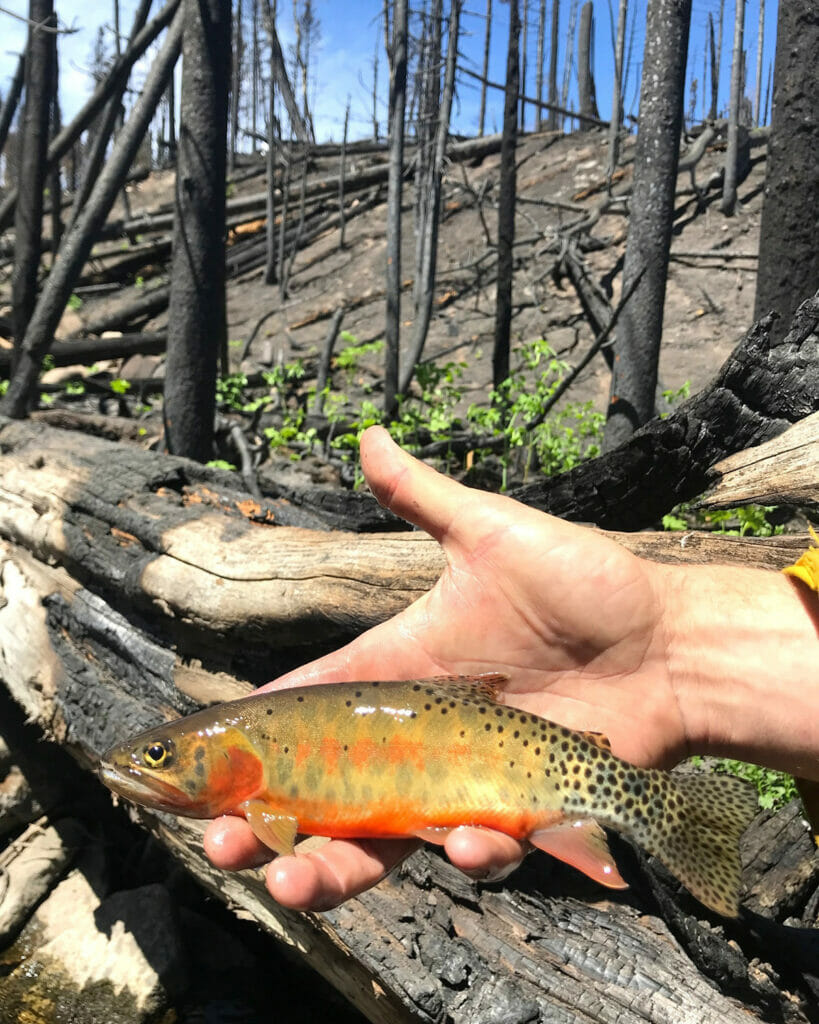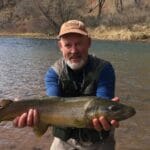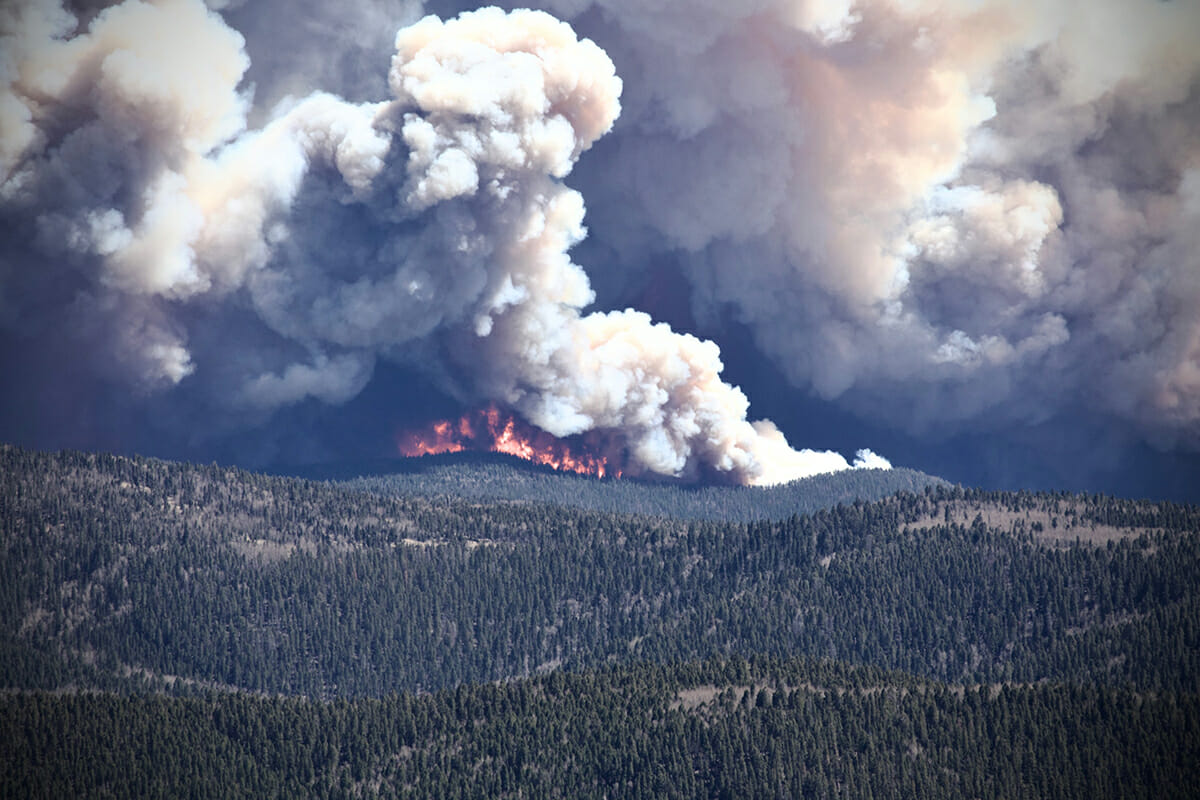Abstaining from fishing doesn’t just happen. There must be a reason.
As New Mexico swims through its third fat month of monsoon season, I’ve barely noticed how much water is in our streams. Winter was scary dry, then our shirt-sleeve spring collided with New Mexico’s largest-ever wildfire. Every morning from April to July, I stepped outside to towers of smoke towering above the mountains to the east. News stories were all tragedy, torched barns and homes, more displaced families whenever the blaze found new fuel.
Only rarely did it occur to me that I should have been fishing. It was the season for it after all, but with the forests on fire, I had difficulty imagining that there was water anywhere, let alone fish that felt like eating during the daylight hours. And by the time the rains finally came, fishing had become an afterthought. Floods and ruined houses were all I saw.
For as long as I can remember, hitting my annual quota of at least 50 fishing days has been a deadly serious commitment. I’ve come up short before, most notably in 2006, when landing a lifetime trophy in February, a fat 20-incher in the form of my newborn son, pretty much scotched the rest of the year. The days I did get out were flails interrupted by daydreams of his toothless smiles and chubby hands.
My only good outing was on the Chama, a blue and breezy day when every drift found a fish eager to grab my nymph. In early afternoon a hatch of yellow mayflies blew up like a snow squall. The river was suddenly splashing with trout and the next couple hours were filled with tantalizing gulps and a constantly bent rod.
It was as though the trout were aware of my borrowed time and had dedicated themselves to giving me the best of it.
Even for a fisherman, there’s no reason beyond blind faith to expect that such an experience would ever repeat itself. Only a fool would deliberately end it, but a bigger fool would take lightly the risk of missing his baby’s bedtime. So in spite of the pretty mayflies crawling around my sunglasses, I reeled up my line and drove home.
It was easy to understand why fishing took a back seat that year. Not so with my current hiatus.
If I’ve learned anything over many decades of identifying as an angler, it’s that abstaining from fishing isn’t something that just happens. There must be a reason.
After several weeks of ruminating (not while fishing, of course), I’ve boiled it down to two.
With the fires chewing through watersheds for months, I became overcome by fear. I honestly believed we were toast. The biggest fire had destroyed dozens of homes belonging to centuries-established families and seemed hellbent on burning past the Colorado border. It hadn’t snowed or rained for months, and we had winds of over 70 miles per hour. At least two cutthroat fisheries—on the Rio Morphy and Alamitos Creek—had already been nuked, and others could be wiped out by ash flows.

On the few occasions I was allowed into the closed forests to check some temperature sensors, I saw little promise that the land would ever heal. Everywhere was dirt, trees were visibly crispy, vulnerable to dry lightning. On one sad day, I could make out protruding ribs in a gang of feral horses from a hundred yards off. Even the cheatgrass seemed to struggle to get off the ground.
Reason No. 2 was simply sloth. I normally keep a strung six-foot fiberglass in the car, alongside my stinky wading boots and a vest. Even my longest work meeting leaves time for a swing by a creek, and how great is any day when just one trout plays a part? That’s not how it went this summer. Even after the rain finally started, my stuff stayed in the closet. It may as well have been chained to a cinderblock.
Using myself as a subject, I’ve conducted extensive research into what appears to be a genetic predisposition among anglers towards laziness. We may tie dozens of flies every week and assiduously check our waders for leaks. We may hit the internet for every method and killer fly pattern that will give us an advantage on our next day on the water. We pack a lunch in mind of protein and fiber. We top off the gas tank just in case. But for all the pride we might take in all our “work,” the likelihood that we’re overcompensating is unmistakable.
When we refer to fishing as an addiction or a passion, we are remembering a first moment when we engaged in a most disorienting type of metaphysical experience. We loved how active fishing was, yet how relaxed it made us feel. Then we chose to recreate that feeling again and again. The feeling was peace, a peace in doing nothing, but with intention and focus. We had recognized, I would argue, the Ferdinand inside ourselves, a bull that prefers resting in the shade of oak trees to butting heads in the field.
Even without a rod in my hand this summer, I was living proof that fear and laziness needn’t preclude a heck of a good time. I joined a seeding crew on the burn scar and climbed some big mountains. I learned more about beavers than I had in ten years, how much watersheds love them and how rural communities could be convinced to love them too. I gained a greater appreciation for how these communities cohere through cooperative agriculture and stewardship-based jobs for their children. I admired how communities responded to the ravages, and welcomed the potential blessings, of fire and rain.
Through my thickening lens of boomer skepticism, I witnessed students applying their technological proclivities to the traditional teachings of their elders. They mapped farm fields and gullies using drones and their phones.
One girl gave me a master course in catching fence lizards during a break from building erosion structures. A flame of youthful curiosity burned bright in her, and I’m still grateful to her for reigniting my own.



